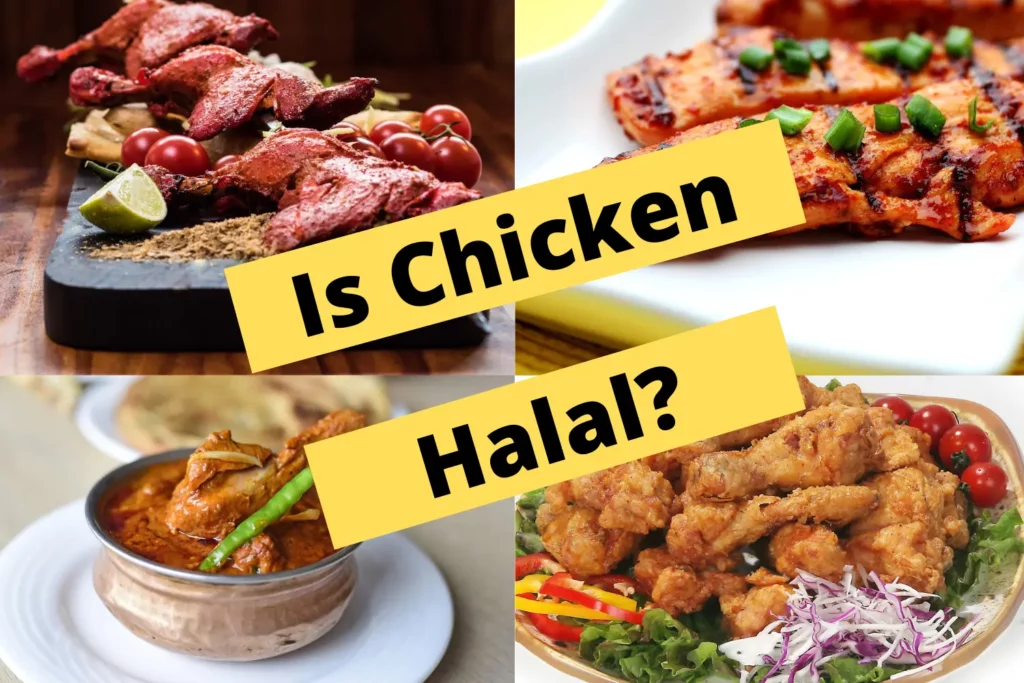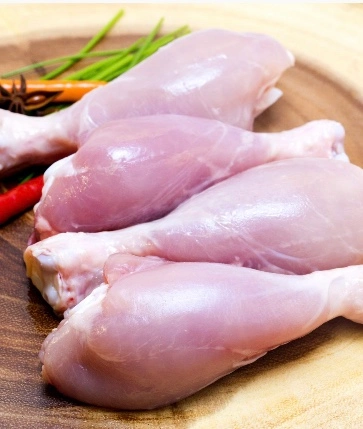Is chicken halal? Gain a thorough understanding of halal chicken, including its dietary guidelines, certification process, and common questions surrounding its halal status. Make informed decisions about consuming halal chicken with confidence.
Table of Contents
ToggleIntroduction
In today’s diverse society, people follow various religious and cultural practices that shape their dietary preferences. For Muslims, adhering to the guidelines of halal food is of utmost importance. Halal refers to what is permissible or lawful according to Islamic law, and it encompasses all aspects of life, including the consumption of food. One of the most common questions asked by Muslims around the world is, “Is chicken halal?” In this comprehensive guide, we will explore the topic of halal chicken, its definition, requirements, and the factors to consider when determining its halal status.
Is Chicken Halal? Understanding the Concept of Halal Food
Halal is an Arabic term that translates to “permissible” or “lawful.” In the context of food, it signifies that the item, including chicken, is prepared and consumed according to Islamic dietary laws. Halal food is not only restricted to Muslims, as many non-Muslims also seek halal-certified products for their assurance of quality and ethical practices.
The Halal Dietary Guidelines
To determine if chicken is halal, it is essential to understand the basic principles and dietary guidelines of halal food:
- Prohibited Ingredients: Islam prohibits the consumption of certain ingredients, including pork and its by-products, alcohol, and any intoxicating substances. These ingredients are considered haram (forbidden) and must be avoided when preparing halal food.
- Slaughtering Method: Halal meat, including chicken, must be slaughtered following specific guidelines. The process involves reciting the name of Allah (God) and using a sharp knife to sever the animal’s throat, ensuring a swift and humane death. This method is called “Zabiha” or “Dhabiha,” and it is believed to minimize the animal’s suffering.
- Blood Removal: Thorough blood removal is crucial in halal meat preparation. According to Islamic teachings, consuming blood is forbidden, so halal chicken undergoes a rigorous process of draining the blood after slaughter.
- Contamination: Halal food should be protected from cross-contamination with non-halal substances during preparation, processing, and storage. This includes ensuring that halal food does not come into contact with utensils, equipment, or surfaces that have been in contact with non-halal ingredients.
- Halal Certification: To provide assurance to consumers, many countries have established halal certification bodies or agencies that inspect and verify the compliance of food products, including chicken, with halal requirements. These certifications help consumers identify products that meet the halal standards.
Now that we have a better understanding of the general principles of halal food, let’s delve into the specific considerations for determining whether chicken is halal.
Is Chicken Halal? Factors to Consider
When assessing the halal status of chicken, several factors come into play. These factors include the source of the chicken, its preparation, and the certification process. Let’s explore each of these factors in more detail:
1. Chicken Source
The source of the chicken plays a crucial role in determining its halal status. To ensure the halal integrity of chicken, it is recommended to obtain it from a reputable supplier who follows Islamic guidelines in breeding, feeding, and slaughtering practices. Look for halal certification on the packaging or inquire about the source’s compliance with halal standards.
2. Slaughtering Method
As mentioned earlier, the slaughtering method is a fundamental aspect of determining if chicken is halal. The Islamic method of slaughter requires the recitation of the name of Allah (God) during the slaughter and the use of a sharp knife to swiftly sever the animal’s throat. This process ensures the animal’s welfare and the draining of blood, which is an essential requirement for halal meat.
It is important to note that machine slaughter, stunning, or any method that renders the animal unconscious before slaughter is not permissible in halal meat production. Muslims who adhere strictly to Islamic dietary laws will seek chicken that has been slaughtered according to the Zabiha method.
3. Cross-Contamination and Preparation
To maintain the halal status of chicken, it is crucial to avoid cross-contamination during the preparation process. This means ensuring that the chicken is not processed, cooked, or stored alongside non-halal ingredients, utensils, or equipment. Proper cleaning and separation of halal and non-halal items are necessary to prevent any compromise in the halal integrity of the chicken.
4. Halal Certification
Halal certification provides consumers with confidence and assurance that the chicken they are purchasing and consuming meets the necessary halal standards. Halal certification bodies or agencies are responsible for inspecting and certifying food products, including chicken, to ensure compliance with halal requirements. Look for recognized halal certification symbols or labels on the packaging to verify the chicken’s halal status.
It is important to remember that halal certification may vary between different countries and regions, so it is advisable to familiarize yourself with the specific certification standards in your locality.
Now that we have discussed the key factors to consider when determining the halal status of chicken, let’s address some frequently asked questions related to this topic.
FAQs: Frequently Asked Questions about Halal Chicken
- Q: Is chicken halal by default? A: No, chicken is not halal by default. The halal status of chicken depends on various factors, including its source, slaughter method, and preparation process. To be considered halal, the chicken must meet the specific requirements outlined in Islamic dietary laws.
- Q: Can Muslims consume non-halal chicken in exceptional circumstances? A: In exceptional circumstances where halal options are not available or accessible, Muslims are permitted to consume non-halal food as a matter of necessity. However, this allowance is subject to the principles of “darurat” (necessity) and “haram bi al-darura” (forbidden due to necessity). Muslims should strive to consume halal food whenever possible.
- Q: Is it necessary to witness the slaughtering process to consider chicken halal? A: While witnessing the slaughtering process is not a requirement for consumers, it is essential for halal certification bodies to ensure compliance with Islamic guidelines. The certification process involves verifying the slaughtering method and ensuring that it aligns with halal requirements.
- Q: Are chicken products from fast-food chains halal? A: Some fast-food chains offer halal chicken options in certain locations, especially in regions with significant Muslim populations. It is important to research and verify the halal certification status of specific outlets or inquire directly with the restaurant to ensure the halal integrity of their chicken products.
- Q: Can halal chicken be prepared with non-halal ingredients? A: No, halal chicken should not be prepared with non-halal ingredients. Halal food preparation requires strict adherence to halal guidelines throughout the entire process, from sourcing ingredients to cooking and serving.
- Q: What is the importance of consuming halal chicken for Muslims? A: For Muslims, consuming halal food is a religious obligation and an integral part of their faith. Adhering to halal guidelines in food consumption ensures that Muslims maintain their spiritual connection and obey the commandments outlined in Islamic teachings.
- If I have any further questions or need assistance, how can I contact you? If you have any questions or need assistance, please feel free to reach out to our knowledgeable team. You can contact us through the provided contact form on our website. We are here to help!
Now that we have addressed some common questions about halal chicken, let’s conclude our comprehensive guide.
Conclusion
In conclusion, the question “Is chicken halal?” requires a careful consideration of various factors, including the source, slaughter method, cross-contamination, and halal certification. Halal chicken refers to chicken that has been sourced, slaughtered, and prepared in accordance with Islamic dietary laws.
To ensure the halal integrity of chicken, it is recommended to obtain it from reputable suppliers who follow Islamic guidelines in all aspects of production. The Zabiha method of slaughter, accompanied by proper blood removal and avoidance of cross-contamination, is crucial in maintaining the halal status of chicken.
Halal certification plays a vital role in providing assurance to consumers and verifying the compliance of chicken products with halal requirements. Look for recognized halal certification symbols or labels on the packaging to ensure that the chicken you are purchasing meets the necessary standards.
As Muslims strive to uphold their religious obligations, consuming halal chicken serves as a means of connecting with their faith and following the principles outlined in Islamic teachings. By understanding the concept of halal food and making informed choices, individuals can confidently enjoy chicken while adhering to their religious beliefs.


